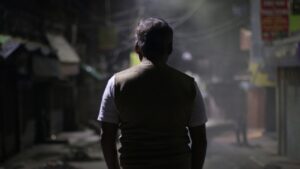Sudhanshu Saria‘s psychological drama portrays the darker side of human insecurities with a tragic real world context while sensitively attempting to be brave in the face of mental struggles. Set in Darjeeling, Knock Knock Knock is the story of how two seemingly alike personalities strike what appears to be an unlikely friendship.
Dada, an elderly Bengali man played by Shantilal Mukherjee is fiercely possessive of his self-designed crosswords and spends most of his time constructing them. Evidently satisfied with his lone existence, he doesn’t take too kindly to a young boy’s incessant attempts at making conversation with him. Played by Phuden Sherpa, the boy’s hopeful, almost overly optimistic personality, is in sharp contrast to the old man’s skepticism.
Although they both hold up a similar lens to the world guided by patterns, the manner in which they view it is very different. The boy, optimistic and wonder-eyed looks outside to the world and seeks meaning behind everything, reducing the chaos in his environment down to carefully designed order. The man, on the other hand, absolves himself of worldly occurrences and their significance in his life; he looks only internally for patterns that will serve the construction of his crosswords.
Just as the film begins to lead us to believe in the complementary nature of their dualism, this difference in seeking validation externally and internally spills over to ultimately serve the climax of the film. On one level, the film is a naked look at our own insecurities and how they are shaped.
The dialogue is conversational and deliberately abstract but I found myself wanting to delve further often; as if I were witnessing a light exchange but deeper conversations lingered in their eyes.
Given that the film runs at 38 minutes, it is slightly longer than a typical short film and well short of a regular feature but Saria does well to disregard any traditional markers when dealing with such a delicate subject in a complex manner and none must apply here.
The film’s take on mental health and relationships goes beyond simplistic archetypal narratives to uncover their undisguised essence. As in the film, there lies more in what is unsaid than shown.
Reserve an hour for the film. And use the last 22 minutes thinking.
Rating: 4/5
Where to watch: Mubi

